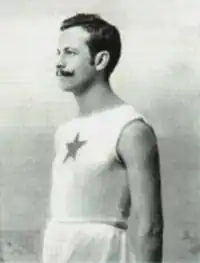Nándor Dáni
 Dáni in the 1890s | |||||||||||||||
| Personal information | |||||||||||||||
|---|---|---|---|---|---|---|---|---|---|---|---|---|---|---|---|
| Born | 2 July 1871 Pest, Austria-Hungary | ||||||||||||||
| Died | 30 December 1948 (aged 77) Budapest, Hungary | ||||||||||||||
Medal record
| |||||||||||||||
Nándor János Dáni (2 July 1871 – 30 December 1948) was a Hungarian athlete. Domestically, he represented multiple sports clubs in multiple sports such as athletics, cycling, and speed skating. During his career, he set two national records in athletics, one in the 100 yards and the other in the 880 yards.
Later on, he was selected to compete for Hungary at the 1896 Summer Olympics. He was entered in four events but only competed in one, the men's 800 metres. There, he earned the silver medal with a time of 2:11.8, earning Hungary's first Olympic medal. Later on, he was elected a member of the Hungarian Athletics Association and became the chairman of a carbonic acid factory.
Biography
Nándor János Dáni was born on 2 July 1871 in Budapest, Austria-Hungary. He started competing in 1886 as a high school student, when he became one of the founding members of Sportkedvelők Köre.[1][2] Later, he represented multiple sports clubs, including Magyar Atlétikai Club (MAC) in athletics and cycling, Neptun Evezős Egyesület in rowing, and Budapesti Korcsolyázó Egylet in speed skating.[3] As a cyclist, he won two editions of a road race competition in 1891 and 1892. As a speed skater, he won a competition the following year from his last cycling competition win.[4] He fully transitioned to practicing athletics upon the end of his cycling career.[1]
He set a Hungarian record in 1894 in the 100 yards with a time of 10.3 seconds and this record remained unbroken for nine years. He also ran a Hungarian record-setting time of 2:05.5 in the 880 yards and it lasted for fourteen years. Dáni was later selected to compete for Hungary at the 1896 Summer Olympics in Athens, Greece. He qualified upon competing at the Hungarian national trials for the Summer Games and won the men's 400, 800, and 1500 metres events.[5] There, he was entered in the men's 100 metres, 400 metres, 1500 metres, and long jump, but did not compete in any of the four events. He only competed in the men's 800 metres.[3]
He competed in the heats on 6 April against three other competitors. There, he was placed second with a time of 2:10.2 and qualified for the finals. In the finals on 9 April, he was placed second with a time of 2:11.8, placing behind Edwin Flack of Australia who had set an Olympic record in the distance.[6] His silver medal win earned for Hungary its first Olympic medal.[3] While some contemporary commentators regarded him as a favourite to win the 800 metres event,[5] he suffered a sprain prior to the final during one of his training sessions in the long jump.[7]
After his career in sport, he was elected a member of the Hungarian Athletics Association. He also became the director and then chairman of a carbonic acid factory. Dáni died on 30 December 1948 in Budapest.[3]
References
- ^ a b "A "M. A. C." új bajnokai: Dáni Nándor és Réty Pál" [The new champions of "M.A.C.": Nándor Dáni and Pál Réty]. Sport-Világ (in Hungarian). 20 October 1895. p. 38. Retrieved 27 July 2025 – via Arcanum Newspapers.
- ^ "Dáni Nándor". Sport-Világ (in Hungarian). Vol. 3, no. 16. 19 April 1896. p. 10. Retrieved 15 August 2025 – via Arcanum Newspapers.
- ^ a b c d "Nándor Dáni Biographical Information". Olympedia. Archived from the original on 21 February 2025. Retrieved 30 June 2025.
- ^ "Dáni Nándor". Magyar életrajzi lexikon. 1967. p. 345. Retrieved 27 July 2025 – via Arcanum Newspapers.
- ^ a b "Három „kengyelfutó" a magyar atlétika hőskorából" [Three "roadrunners" from the heavenly age of Hungarian athletics]. Atlétika (in Hungarian). 1 March 2001. Retrieved 27 July 2025 – via Arcanum Newspapers.
- ^ "800 metres, Men". Olympedia. Archived from the original on 11 February 2025. Retrieved 30 June 2025.
- ^ "Az atlétika úttörője". Hosszabbítás. Nemzeti Sport (in Hungarian). Vol. 112, no. 140. 24 May 2014. p. 7. Retrieved 15 August 2025 – via Arcanum Newspapers.